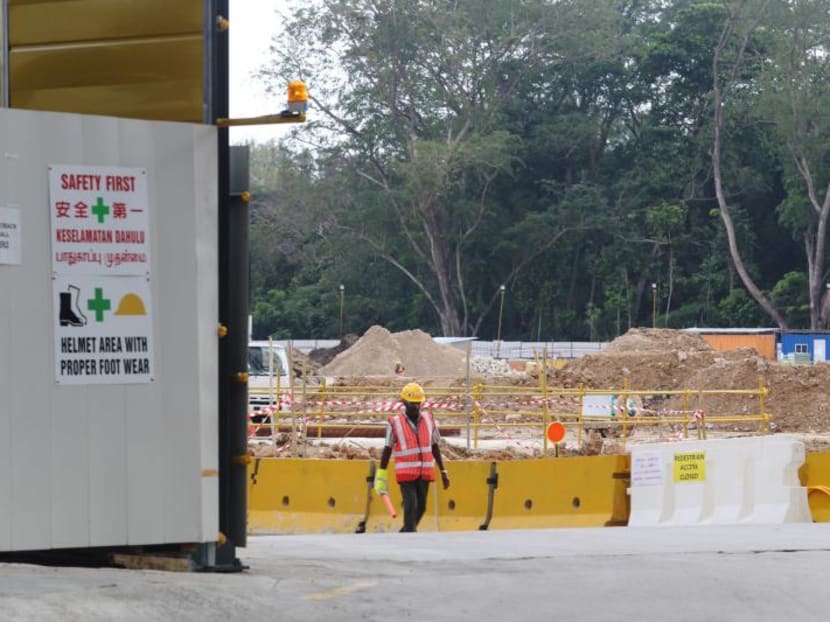S'pore has strict criteria for sand imports, says Govt, as controversy over Cambodian imports brews
SINGAPORE — The Republic stopped importing sand from Cambodia after a ban took effect in Nov last year, said the Ministry of National Development (MND) as the issue of sand imports once again takes the spotlight.
SINGAPORE — The Republic stopped importing sand from Cambodia after a ban took effect in November last year, said the Ministry of National Development (MND) as the issue of sand imports once again takes the spotlight.
Responding to media queries, the MND also stressed that Singapore sets strict criteria for imports of sand, including on environmental protection, but reiterated that sand is imported on a commercial basis and it is the contractors who must meet the criteria. It also said that Singapore has not come across any illegal shipments of sand here.
In Nov, Cambodian authorities reportedly temporarily halted sand exports by companies that hold valid permits after local activists found discrepancies in the export and import trade data from the United Nations. The data showed that Singapore reported 73.6 million tonnes in sand imports from Cambodia since 2007. Yet the Cambodian government reported that only 2.7 million tonnes left for Singapore.
The extraction and export of Cambodian sand has been controversial, as firms allegedly extract sand in defiance of quotas, destroying coastal mangrove systems in the process and affecting the livelihoods of local fishing communities.
Aside from Cambodia, Singapore also imports sand from the Philippines and Myanmar, according to media reports.
Earlier this month, the Cambodian Daily reported that Mother Nature, a non-governmental organisation, was exploring bringing lawsuits against government agencies and companies involved in sand exports to Singapore.
The MND said the Government does not condone any trade or extraction of sand that breaches the source countries’ laws and regulations, and contractors “must source sand from legally permissible areas, comply with all the environmental protection laws of the source country, and have the proper sand export documentation and permits from the relevant authorities in the source countries”.
On the discrepancy in sand trade figures, the MND spokesperson said they are unable to verify this as the figures reported by various parties and countries are dependent on their own calculation formulas that the ministry is not privy to.
She also noted that Singapore has not encountered instances of smuggled sand, or contractors bringing sand into Singapore carrying fake export permits. “The authorities will investigate any such instances and take enforcement action, if evidence is provided,” she added.
Sand is often used in the construction industry to produce cement or used for land reclamation. According to a 2014 United Nations Environment Programme report, Singapore is the largest importer of sand worldwide.
The volumes of sand imported annually into Singapore vary according to the availability of sand and the requirements of the reclamation and construction projects, said the MND. No figures breaking down the uses of sand in Singapore were available.
Speaking to TODAY, Mother Nature co-founder Alex Gonzalez-Davidson said in Cambodia that quotas are on how much sand mining companies can extract, but the companies tend to exceed this as there are no checks and law enforcement.
He also claimed that Cambodian government agencies had “wilfully assisted” these companies by turning a blind eye to violations of regulations or issue documents that do not represent the full amount of sand that was being exported.
The MND said that as sand is not a natural resource in Singapore, it would be “highly challenging” to achieve self-sufficiency. Nonetheless, Singapore has been exploring alternative methods, such as recycling excavated materials from the construction industry to replace a proportion of sand in some reclamation projects, said the spokesperson. The reclamation project in Pulau Tekong will also use a method called empoldering to reduce the amount of sand needed.
BACKGROUND TO THE ISSUE
Singapore’s sand imports have sparked controversy over the years, with environmental activists pointing to the environmental impact from the extraction process.
Malaysia imposed a ban on sand exports in 1997, but Malaysian media have previously reported instances of sand smuggling, allegedly destined for Singapore.
In 2007, Indonesia announced a ban on the export of land sand to Singapore, citing concerns that sand extraction activities were leading to environmental degradation. At the time, 90 per cent of Singapore’s sand imports came from Indonesia, and the ban sparked a supply crunch, leading to a search for sand from other sources.
Cambodia and Vietnam are also source countries, but in 2009, Cambodia banned the export of sand from rivers, although exports from areas where sand was replenished regularly was still allowed. Vietnam followed suit in the same year.
In 2010, anti-corruption non-governmental organisation Global Witness alleged in a report that the Cambodian government was engaging in corrupt practices and ignoring environmental safeguards against sand dredging, and that Singapore was buying sand unsustainably dredged from the rivers in the Koh Kong Province.
Singapore rejected the allegations, stressing that it requires sand vendors to act responsibly and observe source country regulations.







